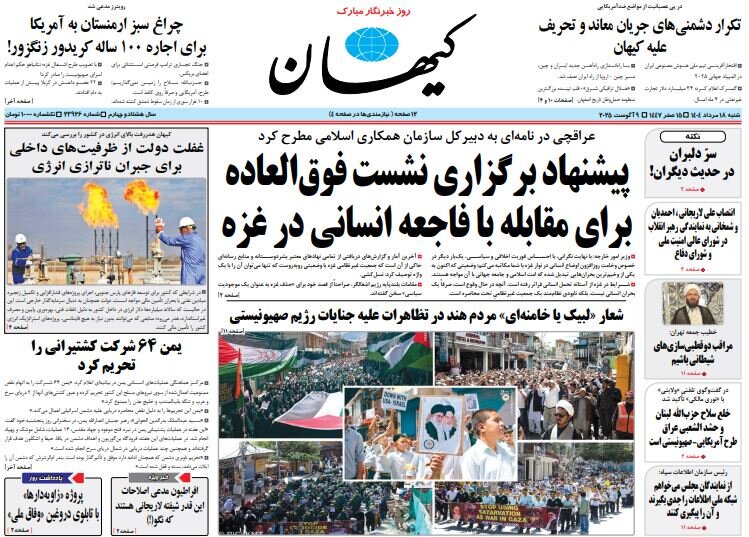Why is Zangezur important?

TEHRAN - Kayhan analyzed the goals behind the establishment of the Zangezur corridor following the signing of an agreement on Friday between the president of Azerbaijan and the prime minister of Armenia in the White House at the presence of Donald Trump.
It wrote: The Zangezur corridor, which connects the Republic of Azerbaijan to Nakhchivan and Turkish territory, is on the surface a development-oriented and transit project, but inwardly, it carries strategic messages that directly target the transit economies of Iran, Russia, and China. Iran's traditional role as a safe and cheap passage for the transit of energy and goods between Central Asia, China, the Caucasus, and Europe has always been a key component of its regional position. With the completion of Zangezur, this role will be greatly reduced because direct communication between the Republic of Azerbaijan and Turkey and beyond, with Europe, will be possible without the need to pass through Iranian territory. From an economic point of view, the most important consequence of this project is the reduction in transit revenues and the weakening of Iran's position in projects such as China's Belt and Road Initiative. This corridor, by removing Iran from the pipeline and rail network, will weaken its bargaining power in the regional market. Zangezur is a project with broad geopolitical goals that seeks to strengthen NATO and Western influence in the South Caucasus and weaken Iran, Russia, and China.
Iran: Tehran will not stop supporting Lebanon
Ahmad Dastmalchian, the former Iranian ambassador to Lebanon, told the Iran newspaper that Iran will not stop to help stabilize Lebanon as the government has voted to disarm Hezbollah. He said: The decision that the Lebanese government has taken regarding Hezbollah’s disarmament is not unrelated to the interventions of trans-regional actors such as the United States and France. Naturally, Iran’s view is based on warnings about the consequences of this intervention and its damage to the interests of Lebanon and regional actors linked to the country. All Lebanese communal groups are somehow related to their beneficiary countries. Iran is no exception to this rule. Lebanon's multi-religious and diverse political character has led Iran to always emphasize intra-dialogue and maintaining internal balance. Iran has long taken pride in supporting the Resistance and has always defended the Lebanese people against the cruel evils and aggressions of the Zionist regime, and it has continued and will continue to do so to the best of its ability.
Farhikhtegan: Nobel Peace laureate defends the aggressor
In a commentary, Farhikhtegan addressed a speech by Nobel Peace Prize winner Narges Mohammadi to a conference celebrating fellow Nobel laureate Nihon Hidankyo's campaigning against nuclear weapons via video link from Iran on the anniversary of the atomic bombings of Hiroshima and Nagasaki. The paper said: Narges Mohammadi was supposed to emphasize peace at the conference, but it turned out the opposite. Instead of condemning the bombers (aggressors), she accused the Iranian people. Instead of condemning Israel and the United States for decades of nuclear threats, sanctions, assassination of scientists, and attacks on Iranian infrastructure, she introduced Iran as responsible for all problems with a kind of language uttered by Western think tanks. Not only was the speech not in the spirit of peace, but it seemed to be a continuation of the same language that she used in her 12-day war declaration, undermining Iran's sovereignty and legitimizing foreign aggression. This ceremony should have been a forum for condemning the government that carried out this nuclear bombing; however, the laureate winner condemned Iran instead of condemning the United States. The Nobel Peace Prize, which was supposed to be a symbol of struggle for peace and justice, has now become a tool for advancing Western policies and a loudspeaker for repeating the West's hostile position against Iran.
Donya-e-Eqtesad: "Trump Route" on the Caucasus Road
In an analysis, Donya-e-Eqtesad addressed the consequences of the signing of an agreement between the Republic of Azerbaijan and Armenia that links mainland Azerbaijan to the autonomous Republic of Nakhichevan through the Armenian land. It wrote: Baku and Yerevan were guests of the White House for a "historic peace meeting" called "Trump Route". Holding such a meeting is considered a pivot in their foreign policy towards the West. However, this process is not without consequences for Iran, while emphasizing its neighborhood policy, it has opposed any changes to the northern borders adjacent to the South Caucasus region. This corridor provides free movement of people and goods between Turkey and the Republic of Azerbaijan and from there to Central Asia, without the need to pass through Iranian or Russian territory. Iran and Russia oppose this project, while Turkey strongly supports it. Although both countries are former Soviet republics, their relations with Moscow have been strained in recent years. According to a U.S. official, opening the route would bring billions of dollars in new trade to the U.S. annually and reduce the influence of Russia, Iran, and China in the region.
Leave a Comment